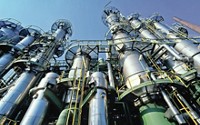Advertisement
Grab your lab coat. Let's get started
Welcome!
Welcome!
Create an account below to get 6 C&EN articles per month, receive newsletters and more - all free.
It seems this is your first time logging in online. Please enter the following information to continue.
As an ACS member you automatically get access to this site. All we need is few more details to create your reading experience.
Not you? Sign in with a different account.
Not you? Sign in with a different account.
ERROR 1
ERROR 1
ERROR 2
ERROR 2
ERROR 2
ERROR 2
ERROR 2
Password and Confirm password must match.
If you have an ACS member number, please enter it here so we can link this account to your membership. (optional)
ERROR 2
ACS values your privacy. By submitting your information, you are gaining access to C&EN and subscribing to our weekly newsletter. We use the information you provide to make your reading experience better, and we will never sell your data to third party members.
Business
World Chemical Outlook
by World Chemical Outlook was compiled by Senior Editor Alexander H. Tullo in New Jersey; Senior Editor Melody Voith in Washington, D.C.; and Senior Correspondents Patricia L. Short in London and Jean-François Tremblay in Hong Kong.
January 12, 2009
| A version of this story appeared in
Volume 87, Issue 2

TASKED WITH EXPLAINING the latest economic indicators, economists sound much like Alexander, the boy in a popular children's book who says, "I could tell it was going to be a terrible, horrible, no good, very bad day." For the global chemical industry, the very bad day started early in the fourth quarter of 2008, and it may last another six months.
The recession that started in the U.S. in late 2007 has touched off an avalanche of increasingly dire projections. Chemical chief executive officers are even gloomier about the future than their counterparts in other industries, according to an international survey by the advisory firm PricewaterhouseCoopers. Only 39% are very confident of achieving growth in 2009, compared with half of CEOs across all sectors.
The consensus of prognosticators is that the global economy will continue to contract in the first half of 2009 and improve sometime after that. Technically, a recession is considered "over" when the gross domestic product stops shrinking. Economists say the recovery, when it comes, will be slow.
Still, a review of last year's conjectures shows just how far off forecasters can be, in large part because it is almost impossible to predict abrupt change. Economists wrongly predicted that most economies would grow in 2008. They did not anticipate $140-per-barrel oil. Also missing from their calculations was the March collapse of Bear Stearns, which roiled financial markets, and September's Hurricanes Gustav and Ike, which shut down U.S. petrochemical production for weeks.
C&EN's 2009 forecasts for the U.S., Canada, Latin America, Europe, and Asia-Pacific tell a common story of how economic woes are affecting the chemical industry. Customers, worried about future demand, are delaying purchases and drawing down their inventories. In response, chemical manufacturers are cutting back production, shutting or idling plants, and in many cases, laying off workers.
Emerging markets took up the slack of flat U.S. and European demand in 2008. But economies in Asia and Latin America that recently experienced huge growth rates will expand more slowly this year.
Volatile energy prices and the strengthening U.S. dollar create new winners and losers. U.S. manufacturers will lose the favorable currency effect they enjoyed in 2008, while a weaker euro will benefit European companies. If the cost of natural gas versus oil decreases, competitive advantage for basic chemicals will further shift from Europe and Asia to the Middle East.




Join the conversation
Contact the reporter
Submit a Letter to the Editor for publication
Engage with us on Twitter